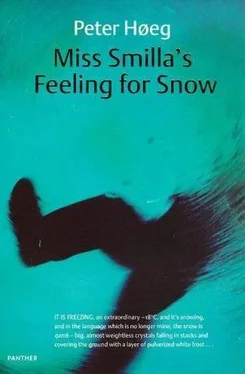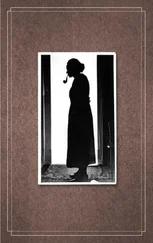Peter Høeg - Smilla's Sense of Snow aka Miss Smilla's Feeling for Snow
Здесь есть возможность читать онлайн «Peter Høeg - Smilla's Sense of Snow aka Miss Smilla's Feeling for Snow» весь текст электронной книги совершенно бесплатно (целиком полную версию без сокращений). В некоторых случаях можно слушать аудио, скачать через торрент в формате fb2 и присутствует краткое содержание. Жанр: Современная проза, на английском языке. Описание произведения, (предисловие) а так же отзывы посетителей доступны на портале библиотеки ЛибКат.
- Название:Smilla's Sense of Snow aka Miss Smilla's Feeling for Snow
- Автор:
- Жанр:
- Год:неизвестен
- ISBN:нет данных
- Рейтинг книги:3 / 5. Голосов: 1
-
Избранное:Добавить в избранное
- Отзывы:
-
Ваша оценка:
- 60
- 1
- 2
- 3
- 4
- 5
Smilla's Sense of Snow aka Miss Smilla's Feeling for Snow: краткое содержание, описание и аннотация
Предлагаем к чтению аннотацию, описание, краткое содержание или предисловие (зависит от того, что написал сам автор книги «Smilla's Sense of Snow aka Miss Smilla's Feeling for Snow»). Если вы не нашли необходимую информацию о книге — напишите в комментариях, мы постараемся отыскать её.
Smilla's Sense of Snow aka Miss Smilla's Feeling for Snow — читать онлайн бесплатно полную книгу (весь текст) целиком
Ниже представлен текст книги, разбитый по страницам. Система сохранения места последней прочитанной страницы, позволяет с удобством читать онлайн бесплатно книгу «Smilla's Sense of Snow aka Miss Smilla's Feeling for Snow», без необходимости каждый раз заново искать на чём Вы остановились. Поставьте закладку, и сможете в любой момент перейти на страницу, на которой закончили чтение.
Интервал:
Закладка:
I unpack. The bathroom is down the corridor. The water from the hot-water tap is scalding. I stand under the shower for a long time. Then I rub my skin with almond oil and put on a jogging suit. I lock the door and lie down under the quilt. The world can come and get me if it needs me. I close my eyes and sink down. Through the gateway. On the desk, Aajumaaq slowly appears. In my dreams I know that it's a dream. It's possible to reach a certain age and a point in your life when even your nightmares start to have a halfway soothing and familiar sense to them. That's about the stage that I've reached.
The engine noise grows louder and they weigh anchor. Then the Kronos sets off. And Jakkelsen opens my door.
I'm positive that I locked it. I make a note that he must have a key. It's a small thing that's worth remembering. "Your uniform," he says outside the door. "We wear uniforms here."
In the closet there are blue pants that are too big, blue T-shirts that are too big, a blue smock that's too big and as shapeless- as a flour sack, and a blue wool sweater. On the floor there's `a pair of short rubber boots with plenty of room to grow into. About five or six sizes, if they're really going to fit.
Jakkelsen is waiting for me outside. He inspects me over his cigarette but doesn't say a word. His fingers drum against the bulkhead; there's a new restlessness about him. He walks on ahead.
At the end of the corridor he turns left to the stairs leading to the upper levels. But I take a right, out onto the deck, and he has to follow me.
I stand by the railing. The air is dripping with ice-cold moisture, the wind is strong and gusty. But you can see lights straight ahead.
"Helsingor-Halsingborg, the strait between Denmark and Sweden. The world's busiest channel, you know. Swedish car ferries, Danish train ferries, a giant marina, container traffic. Every three minutes a ship crosses. There's no other place like it. The Strait of Messina, for instance, I've been there lots of times, it's nothing. This is really something. And in this kind of weather there are disturbances on the radar, it's like taking a submarine through buttermilk soup."
His fingers are drumming nervously on the railing, but his eyes are staring out into the night with what looks like enthusiasm.
"We came through here when I was in the merchant marine school. On board a fullrigger. Sunshine, Kronborg Castle on the port side, and the little girls in the marina got all excited when they saw us."
I go first. We climb up three levels to reach the navigation bridge. To the right of the stairs is the chart room behind two big glass windows. It's dark, but faint red light bulbs glow above laid-out sea charts. We step inside the wheelhouse.
The room is dark. But below us, in the light of a single deck lamp, 250 feet forward in the night, lies the deck of the Kronos. Two 60-foot masts with heavy cargo booms. At each mast four cargo winches; at the entrance to the short, elevated foredeck, a control box for the winches. Between the masts, on the deck, is a rectangular shape under a tarp where several small blue figures are working to secure long, criss-crossed rubber straps. Maybe it's the LMC, the navy's surplus landing vessel. On the foredeck, a huge anchor winch and a hatch in four sections over a cargo hold. Every three feet along the sea rail there's an upright white floodlight. In addition, fire hydrants, foam fire extinguishers and rescue equipment. Nothing else. The deck is clear and shipshape.
And now empty as well. While I've been surveying the deck, the blue figures have disappeared. Now the light is turned off and the deck vanishes. Far forward, where the bow chops through the waves, white protuberances of displaced water suddenly appear. On both sides of the ship, surprisingly close, the lights of the shores can be seen. The little passenger ferries cross behind and in front of us. In the rain the yellow floodlights make Kronborg Castle look like a drab modern prison.
Two slowly rotating green radar images glow from the darkness of the room. A red dot of dull light in a big liquid compass. In front of the window, with one hand on the manual tiller, stands a man, his back partly turned toward us. It's Captain Sigmund Lukas. Behind him a straight-backed, motionless figure. Next to me Jakkelsen is rocking restlessly on the balls of his feet.
"You can go." Lukas speaks softly, without turning around. The figure behind him slips out the door. Jakkelseri follows him. For a moment his movements show no reluctance.
My eyes slowly grow used to the dark, and out of nothingness appear the instruments; some I recognize, some I don't, but I've always kept my distance from all of them because they belong to the open sea. And because, for me, they symbolize a culture that has inserted a layer of lifeless instruments between itself and its attempt to determine its location.
The liquid crystals on the SATNAV computer, the shortwave radio, consoles for LORAN C, a radio location system that I've never understood. The red numbers on the sounding device. The console of the navigational sonar. The inclinometer. A sextant on a tripod. Instrument panels. The phone to the engine room. Visibility dials. A radio locator. The automatic pilot. Two panels full of volt meters and control lights. And above all of it Lukas's alert, expressionless face.
The VHF emits a continuous crackle. Without shifting his gaze, the captain reaches over and turns it off. There is silence.
"You're on board because we needed a cabin attendant. A stewardess, as it's now called. Not for any other reason. That conversation we had was an employment interview, nothing else."
In my floppy sea boots and much too large sweater I feel like a little girl being disciplined in school. Not once does he look at me.
"We haven't been able to find out where we're going. We'll be told later. Until then we're following our noses due north."
There's something different about him. It's his cigarettes. They're gone. Maybe he doesn't smoke at sea. Maybe he sails to get away from the gambling tables and the cigarettes.
"First Mate Sonne will show you around and point out your work areas. Your duties include light cleaning, and you're responsible for the ship's laundry. You will also occasionally wait on the officers."
The question is why he's taken me along at all.
When I reach the door he calls after me, his voice bitter and low. "You heard what I said, didn't you? You understand that we're sailing without knowing our destination?"
Sonne is waiting for me outside the door. Young, polite, his hair close-cropped. We go down one level to the boat deck. He turns toward me, lowers his voice, and looks at me gravely.
"We have representatives from the shipping company with us on this trip. They live in the forecastle on the boat deck. There's no admittance whatsoever. Unless you're called on to serve a meal. Otherwise no. No cleaning, no little errands."
We continue down. The laundry, the drying room, and the linen supply area are located on the promenade deck. On the upper deck, along with my cabin, there are living quarters, offices for the engineer and electricians, the galley and the crew's mess. On the second deck are the cold storage rooms and freezer for foodstuffs, storerooms, two workshops, the COZ room. All of this is located in and below the superstructure; just in front of it and farther forward are the engine room, tanks, tunnels, and the cargo holds.
I follow him up to the upper deck. Along the corridor past my own cabin. Farthest back on the port side is the mess. He pushes open the door and we step inside.
I take my time and count eleven people in that little room. Five Danes, six Asians. Two of the latter are women. Three of the men look like little boys.
"Smilla Jaspersen, the new stewardess."
Читать дальшеИнтервал:
Закладка:
Похожие книги на «Smilla's Sense of Snow aka Miss Smilla's Feeling for Snow»
Представляем Вашему вниманию похожие книги на «Smilla's Sense of Snow aka Miss Smilla's Feeling for Snow» списком для выбора. Мы отобрали схожую по названию и смыслу литературу в надежде предоставить читателям больше вариантов отыскать новые, интересные, ещё непрочитанные произведения.
Обсуждение, отзывы о книге «Smilla's Sense of Snow aka Miss Smilla's Feeling for Snow» и просто собственные мнения читателей. Оставьте ваши комментарии, напишите, что Вы думаете о произведении, его смысле или главных героях. Укажите что конкретно понравилось, а что нет, и почему Вы так считаете.




![Рута Шепетис - Ashes in the Snow [aka Between Shades of Gray]](/books/414915/ruta-shepetis-ashes-in-the-snow-aka-between-shades-thumb.webp)







